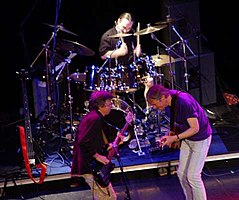Camel (band)
| Camel | |
|---|---|

Camel performing in 2003.
|
|
| Background information | |
| Origin | Guildford, Surrey, England |
| Genres | |
| Years active | 1971–present |
| Labels | |
| Website | camelproductions |
| Members |
|
| Past members | |
Camel are an English progressive rock band formed in 1971. Led by founding member Andrew Latimer, they have produced 14 original studio albums, 14 singles plus numerous other compilation and live albums.
Andrew Latimer (guitar), Andy Ward (drums) and Doug Ferguson (bass) had been playing as a trio called The Brew around the Guildford, Surrey area of England. On 20 February 1971, they auditioned to be the back-up band to singer/songwriter Phillip Goodhand-Tait and released an album with him in August 1971 titled I Think I'll Write a Song on DJM Records. This would be their first and last album with Goodhand-Tait. They recruited Peter Bardens (keyboards) and after an initial gig to fulfill a Bardens commitment on 8 October 1971 in Belfast, Northern Ireland under the name of 'Peter Bardens' On', they changed their name to Camel. Their first gig was at Waltham Forest Technical College, London supporting Wishbone Ash on 4 December 1971.
In August 1972 Camel signed with MCA Records and their eponymous debut album Camel (1973) was released six months later. The record was not a success and the band moved to the Deram Records division of Decca Records (UK).
In 1974 they released their second album; the critically acclaimed Mirage, on which Latimer showed he was also adept on flute. Although failing to chart at home, it gained success on the U.S. west coast, prompting a three-month tour there.
Released in 1975, the instrumental, orchestrated concept album The Snow Goose, inspired by the Paul Gallico short story of the same name was the breakthrough album that brought Camel wider attention and success, but not without difficulty, in the form of a lawsuit brought against them by Gallico. Several websites erroneously state that the reason for this was that Gallico "loathed smoking" and thought the band were related to the cigarette brand (the artwork for the cover of Mirage is, after all, simply a "miragey" rework of the cigarette packet artwork). In reality Gallico described himself as "an addict of the vice in all its blackest forms" and his objection was simply on the grounds of copyright infringement. Camel accordingly added the prefix 'Music inspired by...' to the album's front cover and removed the story notes from the back cover. The album's success led to a prestigious sell out concert at the Royal Albert Hall, London, with the London Symphony Orchestra on 17 October 1975.
...
Wikipedia
